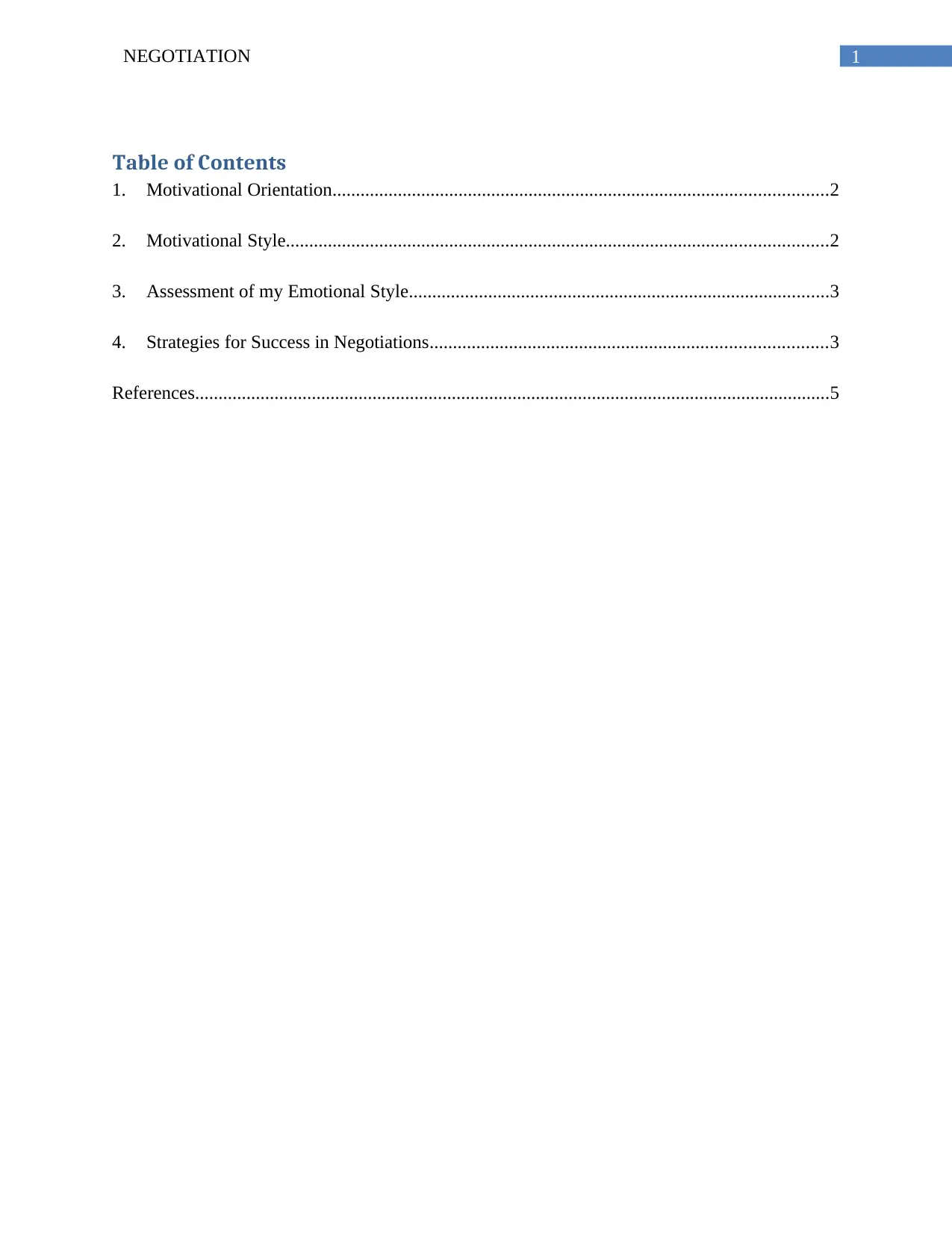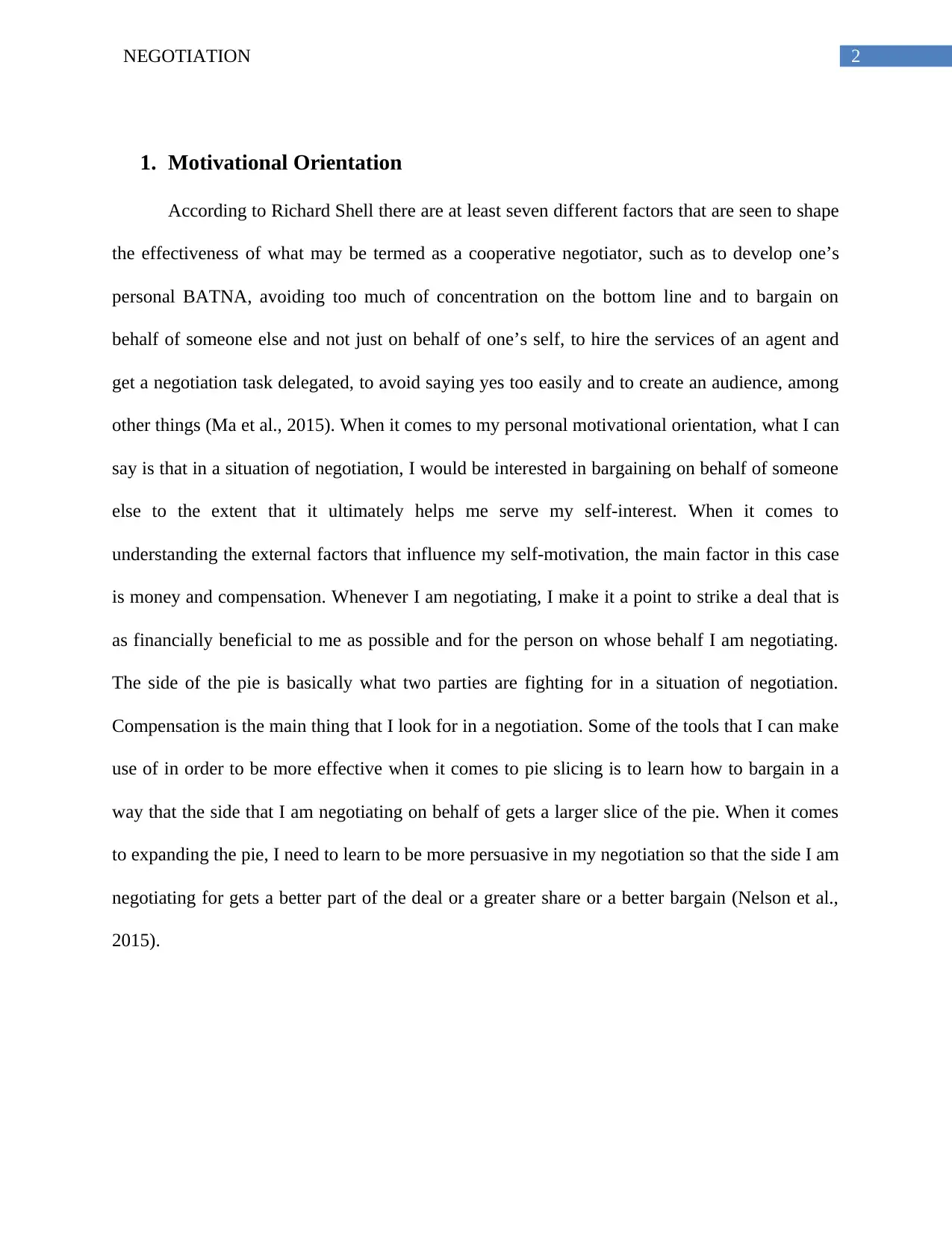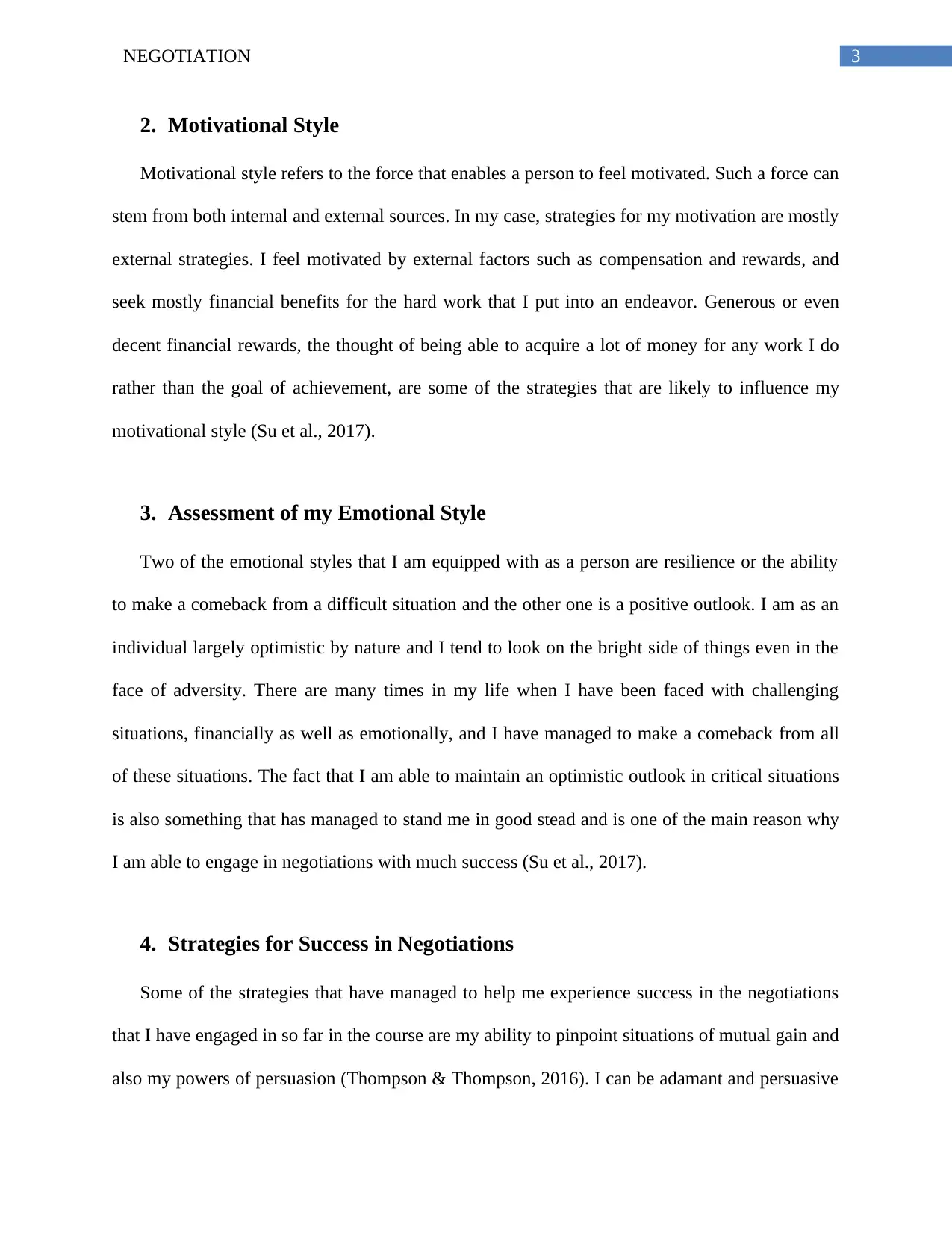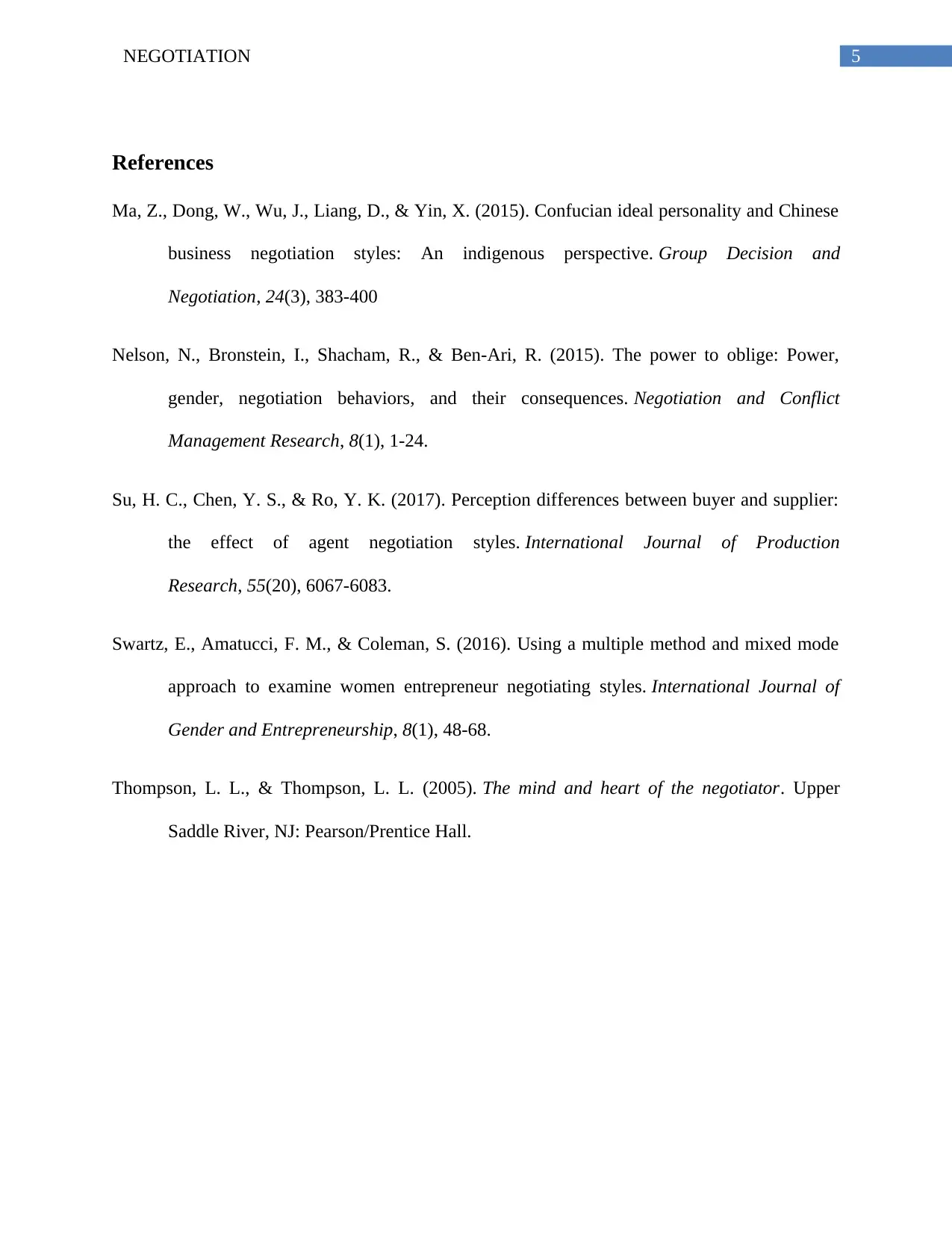Negotiation Strategies for Success in Negotiations
VerifiedAdded on 2022/11/13
|6
|1102
|467
AI Summary
This document discusses the motivational orientation, motivational style, assessment of emotional style, and strategies for success in negotiations. It also provides references for further reading.
Contribute Materials
Your contribution can guide someone’s learning journey. Share your
documents today.

Running head: NEGOTIATION
Negotiation
Name of the Student
Name of the University
Author Note
Negotiation
Name of the Student
Name of the University
Author Note
Secure Best Marks with AI Grader
Need help grading? Try our AI Grader for instant feedback on your assignments.

1NEGOTIATION
Table of Contents
1. Motivational Orientation..........................................................................................................2
2. Motivational Style....................................................................................................................2
3. Assessment of my Emotional Style..........................................................................................3
4. Strategies for Success in Negotiations.....................................................................................3
References........................................................................................................................................5
Table of Contents
1. Motivational Orientation..........................................................................................................2
2. Motivational Style....................................................................................................................2
3. Assessment of my Emotional Style..........................................................................................3
4. Strategies for Success in Negotiations.....................................................................................3
References........................................................................................................................................5

2NEGOTIATION
1. Motivational Orientation
According to Richard Shell there are at least seven different factors that are seen to shape
the effectiveness of what may be termed as a cooperative negotiator, such as to develop one’s
personal BATNA, avoiding too much of concentration on the bottom line and to bargain on
behalf of someone else and not just on behalf of one’s self, to hire the services of an agent and
get a negotiation task delegated, to avoid saying yes too easily and to create an audience, among
other things (Ma et al., 2015). When it comes to my personal motivational orientation, what I can
say is that in a situation of negotiation, I would be interested in bargaining on behalf of someone
else to the extent that it ultimately helps me serve my self-interest. When it comes to
understanding the external factors that influence my self-motivation, the main factor in this case
is money and compensation. Whenever I am negotiating, I make it a point to strike a deal that is
as financially beneficial to me as possible and for the person on whose behalf I am negotiating.
The side of the pie is basically what two parties are fighting for in a situation of negotiation.
Compensation is the main thing that I look for in a negotiation. Some of the tools that I can make
use of in order to be more effective when it comes to pie slicing is to learn how to bargain in a
way that the side that I am negotiating on behalf of gets a larger slice of the pie. When it comes
to expanding the pie, I need to learn to be more persuasive in my negotiation so that the side I am
negotiating for gets a better part of the deal or a greater share or a better bargain (Nelson et al.,
2015).
1. Motivational Orientation
According to Richard Shell there are at least seven different factors that are seen to shape
the effectiveness of what may be termed as a cooperative negotiator, such as to develop one’s
personal BATNA, avoiding too much of concentration on the bottom line and to bargain on
behalf of someone else and not just on behalf of one’s self, to hire the services of an agent and
get a negotiation task delegated, to avoid saying yes too easily and to create an audience, among
other things (Ma et al., 2015). When it comes to my personal motivational orientation, what I can
say is that in a situation of negotiation, I would be interested in bargaining on behalf of someone
else to the extent that it ultimately helps me serve my self-interest. When it comes to
understanding the external factors that influence my self-motivation, the main factor in this case
is money and compensation. Whenever I am negotiating, I make it a point to strike a deal that is
as financially beneficial to me as possible and for the person on whose behalf I am negotiating.
The side of the pie is basically what two parties are fighting for in a situation of negotiation.
Compensation is the main thing that I look for in a negotiation. Some of the tools that I can make
use of in order to be more effective when it comes to pie slicing is to learn how to bargain in a
way that the side that I am negotiating on behalf of gets a larger slice of the pie. When it comes
to expanding the pie, I need to learn to be more persuasive in my negotiation so that the side I am
negotiating for gets a better part of the deal or a greater share or a better bargain (Nelson et al.,
2015).

3NEGOTIATION
2. Motivational Style
Motivational style refers to the force that enables a person to feel motivated. Such a force can
stem from both internal and external sources. In my case, strategies for my motivation are mostly
external strategies. I feel motivated by external factors such as compensation and rewards, and
seek mostly financial benefits for the hard work that I put into an endeavor. Generous or even
decent financial rewards, the thought of being able to acquire a lot of money for any work I do
rather than the goal of achievement, are some of the strategies that are likely to influence my
motivational style (Su et al., 2017).
3. Assessment of my Emotional Style
Two of the emotional styles that I am equipped with as a person are resilience or the ability
to make a comeback from a difficult situation and the other one is a positive outlook. I am as an
individual largely optimistic by nature and I tend to look on the bright side of things even in the
face of adversity. There are many times in my life when I have been faced with challenging
situations, financially as well as emotionally, and I have managed to make a comeback from all
of these situations. The fact that I am able to maintain an optimistic outlook in critical situations
is also something that has managed to stand me in good stead and is one of the main reason why
I am able to engage in negotiations with much success (Su et al., 2017).
4. Strategies for Success in Negotiations
Some of the strategies that have managed to help me experience success in the negotiations
that I have engaged in so far in the course are my ability to pinpoint situations of mutual gain and
also my powers of persuasion (Thompson & Thompson, 2016). I can be adamant and persuasive
2. Motivational Style
Motivational style refers to the force that enables a person to feel motivated. Such a force can
stem from both internal and external sources. In my case, strategies for my motivation are mostly
external strategies. I feel motivated by external factors such as compensation and rewards, and
seek mostly financial benefits for the hard work that I put into an endeavor. Generous or even
decent financial rewards, the thought of being able to acquire a lot of money for any work I do
rather than the goal of achievement, are some of the strategies that are likely to influence my
motivational style (Su et al., 2017).
3. Assessment of my Emotional Style
Two of the emotional styles that I am equipped with as a person are resilience or the ability
to make a comeback from a difficult situation and the other one is a positive outlook. I am as an
individual largely optimistic by nature and I tend to look on the bright side of things even in the
face of adversity. There are many times in my life when I have been faced with challenging
situations, financially as well as emotionally, and I have managed to make a comeback from all
of these situations. The fact that I am able to maintain an optimistic outlook in critical situations
is also something that has managed to stand me in good stead and is one of the main reason why
I am able to engage in negotiations with much success (Su et al., 2017).
4. Strategies for Success in Negotiations
Some of the strategies that have managed to help me experience success in the negotiations
that I have engaged in so far in the course are my ability to pinpoint situations of mutual gain and
also my powers of persuasion (Thompson & Thompson, 2016). I can be adamant and persuasive
Secure Best Marks with AI Grader
Need help grading? Try our AI Grader for instant feedback on your assignments.

4NEGOTIATION
and I have this ability to get the other party to see things from my perspective and to act in a way
that is of mutual interest rather than one party winning and the other party losing. Some of the
strategies that I believe I need to deploy in order to be successful in whatever negotiations that I
engage in, in the future are try and find out more about what the bottom line offers are so that I
can argue with a greater degree of persuasiveness, and to ask for more than what is required
when looking to settle for a good deal. In the event that it is not possible for the other party to
offer what I negotiate for in excess, then I can think of settling for a compromise, an approach
which I believe will favor me during any negotiation (Swartz et al., 2016).
and I have this ability to get the other party to see things from my perspective and to act in a way
that is of mutual interest rather than one party winning and the other party losing. Some of the
strategies that I believe I need to deploy in order to be successful in whatever negotiations that I
engage in, in the future are try and find out more about what the bottom line offers are so that I
can argue with a greater degree of persuasiveness, and to ask for more than what is required
when looking to settle for a good deal. In the event that it is not possible for the other party to
offer what I negotiate for in excess, then I can think of settling for a compromise, an approach
which I believe will favor me during any negotiation (Swartz et al., 2016).

5NEGOTIATION
References
Ma, Z., Dong, W., Wu, J., Liang, D., & Yin, X. (2015). Confucian ideal personality and Chinese
business negotiation styles: An indigenous perspective. Group Decision and
Negotiation, 24(3), 383-400
Nelson, N., Bronstein, I., Shacham, R., & Ben‐Ari, R. (2015). The power to oblige: Power,
gender, negotiation behaviors, and their consequences. Negotiation and Conflict
Management Research, 8(1), 1-24.
Su, H. C., Chen, Y. S., & Ro, Y. K. (2017). Perception differences between buyer and supplier:
the effect of agent negotiation styles. International Journal of Production
Research, 55(20), 6067-6083.
Swartz, E., Amatucci, F. M., & Coleman, S. (2016). Using a multiple method and mixed mode
approach to examine women entrepreneur negotiating styles. International Journal of
Gender and Entrepreneurship, 8(1), 48-68.
Thompson, L. L., & Thompson, L. L. (2005). The mind and heart of the negotiator. Upper
Saddle River, NJ: Pearson/Prentice Hall.
References
Ma, Z., Dong, W., Wu, J., Liang, D., & Yin, X. (2015). Confucian ideal personality and Chinese
business negotiation styles: An indigenous perspective. Group Decision and
Negotiation, 24(3), 383-400
Nelson, N., Bronstein, I., Shacham, R., & Ben‐Ari, R. (2015). The power to oblige: Power,
gender, negotiation behaviors, and their consequences. Negotiation and Conflict
Management Research, 8(1), 1-24.
Su, H. C., Chen, Y. S., & Ro, Y. K. (2017). Perception differences between buyer and supplier:
the effect of agent negotiation styles. International Journal of Production
Research, 55(20), 6067-6083.
Swartz, E., Amatucci, F. M., & Coleman, S. (2016). Using a multiple method and mixed mode
approach to examine women entrepreneur negotiating styles. International Journal of
Gender and Entrepreneurship, 8(1), 48-68.
Thompson, L. L., & Thompson, L. L. (2005). The mind and heart of the negotiator. Upper
Saddle River, NJ: Pearson/Prentice Hall.
1 out of 6
Your All-in-One AI-Powered Toolkit for Academic Success.
+13062052269
info@desklib.com
Available 24*7 on WhatsApp / Email
![[object Object]](/_next/static/media/star-bottom.7253800d.svg)
Unlock your academic potential
© 2024 | Zucol Services PVT LTD | All rights reserved.
